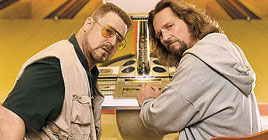|
|
|
|
The
Big Lebowski
|
 |
|
Usually, when a top director makes a dud film, commentators kindly bracket it off as a stylistic miscalculation or poor choice of material in that person's career – which, for instance, is the likely case with Clint Eastwood's Midnight in the Garden of Good and Evil (1997). Sometimes, however, a crashingly bad movie prompts even the firmest fans of a filmmaker to look back less kindly on his or her past work – to finally acknowledge the limitations and problems that have always lurked there, just waiting to run rife. The Big Lebowski offers this mode of disenchantment. The latest, gruesome effort from Joel and Ethan Coen (Miller's Crossing [1990], Fargo [1996]) is surely one of the least bearable films of 1998. Suddenly, the dubious facets that were kept under control in their previous films – the relentless smarty-pants humour, the generalised misanthropy and condescension, the show-off technique – march to the foreground and obliterate all else. It would be silly to accuse this film of losing its way or squandering its opportunities for seriousness, since it is a militantly aimless and pointless farrago. The Coens, devising a mystery story reminiscent of Raymond Chandler's The Big Sleep, take the sarcasm and loose-limbed air of Robert Altman's The Long Goodbye (1973) to auto-destructive extremes. Jeff Lebowski (Jeff Bridges), aka The Dude, an unemployed, hedonistic proto-slacker, is mistaken by mobsters for a millionaire of the same name. This propels him into a bizarre underworld populated by bungling henchmen, pretentious artists and sinister criminals. Only Jeff's bowling pals, Walter (John Goodman) and Donny (Steve Buscemi), can offer any help or advice – and that tends only to compound the Dude's escalating catastrophe. The Coens' line in comedy increasingly resembles a very forced, sub-standard episode of The Simpsons. All characters, major or minor, function as quotations from classic pop texts – such as the painter-dominatrix (Julianne Moore) who would be right at home in Martin Scorsese's After Hours (1985). Although the film makes a great noise about its precise historic setting – the Dude as a "man for his time" during the Gulf War – there is scarcely a single mannerism or reaction which could not have come straight from any of the lazy, counter-culture, Cheech and Chong-style comedies of the '70s. Grating gags – which always insist on the ugliness, meanness and stridency of these cardboard cut-out characters – are repeated ad nauseam. The Coens attempt to cover the unpleasantness of their project here by transparently inserting a tiny touch of mortal pathos and – far more vigorously – ensuring that they outflank their critics. Their method, on this latter score, is certainly ingenious. Every time that one feels, as a viewer, that The Big Lebowski is becoming tastelessly sexist, racist, nihilistic or just plain dopey, up pops a new character with a zany speech about gender politics in modern art, national stereotypes in popular music, or the wayward flight of the humble bowling ball as the best metaphor for existence. This might be cheeky fun it if did anything other than simply short-circuit the movie and reduce it to a numbing state of exhibitionistic banality. MORE Coens: Barton Fink, Intolerable Cruelty, The Man Who Wasn't There © Adrian Martin April 1998 |
![]()